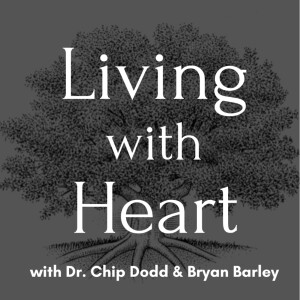
Tuesday Sep 10, 2024
36 - Symptoms of Codependency (Part 2)
Click here to view the episode highlights.
The "Living with Heart" Podcast is brought to you by Chip Dodd Resources (www.chipdodd.com) and The Voice of the Heart Center (vothcenter.com). Contact Bryan Barley for coaching at bryan@vothcenter.com.
Structure of Symptoms of Codependency
- Name the symptom
- Identify the fear that it’s grounded in
- Identify the toxic shame that it is birthed in
- Discuss its impaired expression in our lives
- Discuss what it was meant to be
Codependency recovery and codependency illness is not an either/or; it’s both/and.
Just like addiction, codependency is an attempt to have a full life, without having to be truly human and having to deal with needs, embarrassment and vulnerability. It is both/and as an impaired way of living and an attempt to find full life.
Recovery is developing a tolerance for vulnerability.
Vulnerability is the key to identifying myself as human, having feelings and being in need; and identifying others who are capable of feeling and being in need.
Codependency is the loss of self, and all that comes with self, given over to significant others because they are uncomfortable with someone being human in their presence. So, with our need to belong and matter, we will sacrifice how God made us to belong and matter to those who are actually running from themselves.
Sadly, children don’t know that these caregivers are running from themselves because children look at their caregivers knowing that they are big and the child is little. They think, “You must be right because you’re big; therefore, I must be wrong.”
The caregiver’s toxic shame and defenses, and their protection from their own internal world become a rejection to belonging and mattering for the child.
The origin of how we’re created is found in this equation:
intuition + suspicion + questions = the growing ability to discern
- where I am
- who I’m with
- what I need to do
This means I am listening to my internal world.
Intuition + suspicion + questions = discernment.
Intuition + suspicion + defensiveness = judgmentalism. Judging my environment around me all the time based upon making sure that I do not end up looking little, stupid, or weak. This is the fear and toxic shame of vulnerability.
So, your whole life revolves around trying to fit in based upon your performance again, rather than being how you are made. This requires that you ask a lot of questions.
Asking questions is a solution that helps separate us from judgment and return us to discernment.
No comments yet. Be the first to say something!